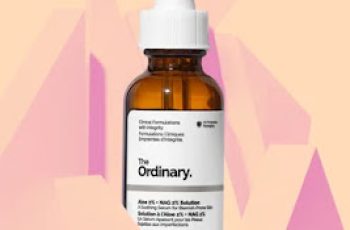
How To Treat Melasma From The Inside
It is hard to clear melasma with skin care alone, so you should also treat melasma from the inside with diet, supplements and vitamins.
Here we will explain how to treat melasma internally and naturally using vitamins, supplements, pills and melasma treatments.
The most effective way to get rid of melasma naturally is to limit sun, heat and light exposure. We recommend sun avoidance and wearing a sunscreen everyday!
You will get the fastest and best results if use a skincare routine for melasma in addition to any oral supplements, vitamins or oral medications you choose to use as melasma treatments. Your skin care routine works from the outside while supplements and vitamins and diet work from the inside.
Targeting melasma from the outside and the inside and adjusting lifestyle habits helps you get rid of melasma faster.
Your health and melasma
Inflammation
Melasma is made worse by skin inflammation so any lifestyle changes you make to cure melasma should target inflammation.
It is possible, but not proven, that systemic inflammation can worsen melasma. Inflammation is known to increase skin pigmentation and aging so decreasing inflammation in your body is always a good idea.
Ways to decrease inflammation in the skin and body:
Take antioxidant and anti-inflammatory supplements
Reduce stress. Stress levels raise cortisol levels which affects your hormones and can worse melasma.
Sleep at least 7 hours
Eat lots of fruits and vegetables because they have antioxidants.
Add salmon and flax seeds in the diet
Serum Lipids
One study showed that those with melasma had a higher LDL (low-density lipoprotein) than those who did not have melasma. (9)
Thyroid
A 2011 study found that out of 312 cases (6.41%) of melasma in India, 20 had hypothyroidism. (13). Other studies have also suggested an association between autoimmune thyroid disease and melasma , (14-17)
If you have melasma, I suggest that you get a blood test to test your thyroid function.
Liver Function
Having melasma is not a sign of liver disease. A study in 2021 looked at liver function, metabolic syndrome and serum lipids and found that there was no relationship with any disease states, poor health, or with liver function. (9)
Food and supplements for melasma
Vitamins and Supplements
I will review the use of vitamins, supplements and a melasma pill to treat melasma internally. However, these ill not work alone. You need to treat melasma from the outside with skin care products at the same time.
Before buying any skin care products- make sure you are choosing the best melasma treatments for your Baumann Skin Type (there are 16 skin types!)
Take the Quiz
16 Bauman Skin Types
Vitamin Deficiencies and Melasma
As a dermatologist, I am often asked if Zinc deficiency or Vitamin D deficiency play a role in developing melasma. While vitamin deficiencies do cause skin problems, there are no known vitamin deficiencies that always cause melasma.
Some small studies have reported lower iron or Vitamin B12 levels in people with melasma but these were too small to be meaningful. Remember- just because someone has low B12 levels and melasma does not mean the Vitamin B 12 deficiency has anything to do with the melasma.
There are some studies about zinc and melasma which are described below.
We do know that hormones play a very significant role in causing melasma. Estrogen is a major cause of melasma.
Vitamins and supplements that have antioxidant or anti-inflammatory activity can help melasma by reducing skin inflammation. It is well known that inflammation causes skin pigmentation. This is why you need to know if you have sensitive skin. Sensitive skin is more likely to get irritated and inflamed which is a cause of melasma.
Take the Quiz
Melatonin
Melatonin for Melasma
While melatonin has been touted as a natural melasma treatment for a number of years, there is conflicting evidence as to its efficacy to cure melasma.
Melatonin is an antioxidant and can protect the skin from sun exposure. It is a natural hormone produced by the body, usually to help regulate sleep. But as an oral supplement for melasma, it protects the skin against the free radical damage caused by sun exposure, by slowing down and even reversing the dark spots on the skin that UV damage can cause.1 2
Does melatonin make melasma worse?
It is possible that melatonin can make melasma worse by stimulating melanocyte-stimulating hormone which increases the production of melanin.
Melanocytes are cells in the skin that produce pigmentation, thus counteracting your efforts to even out your skin tone.
At this point, we really do not know if melatonin improves or worsens melasma.
We recommend sticking to a custom skincare routine without a melatonin supplement to get the best benefit for your skin until more is known about the effects of melatonin on melasma.
We often discuss this on our social media @SkinTypeSolutions if you have experience with melatonin for melasma that you would like to share with our team of dermatologists.
Vitamins For Melasma Treatment
There are plenty of vitamins for melasma treatment available that will bolster your melasma skincare routine and help to even out your skin tone. Here we look at using Vitamin A, Vitamin B5, Vitamin B12, Vitamin C, and Vitamin E to treat melasma.
Vitamin C
Vitamin A for Melasma
Vitamin A is an important vitamin for your skin. However, Vitamin A supplements are not used to treat melasma because high doses (over 10,000 IUs) can be toxic.
Instead, we use topical Vitamin A known as retinoids to treat melasma and other forms of hyperpigmentation.
Retinoids help melasma by increasing exfoliation and blocking melanin production.
Vitamin A can also be found in foods such as:
beef liver
broccoli
cantaloupe
carrots
eggs
fish oils
kale
mango
milk
pumpkin
red bell pepper
spinach
squash
sweet potatoes
tomatoes
Vitamin B5 for Melasma
Vitamin B5, also known as pantothenic acid, is an essential nutrient that helps your body turn food into energy, as well as being necessary for the formation of red blood cells.
While there are no studies that review the use of vitamin B5 as a melasma treatment, it is an anti-inflammatory vitamin.
The topical form of vitamin B5 is known as dexpanthenol or panthenol and is used as an anti-redness ingredient in skincare products. Panthenol also softens and moisturizes the skin.
The anti-inflammatory effects of vitamin B5 might help to improve melasma, because we know that inflammation is one of the causes of skin pigmentation.
Vitamin B12 for Melasma
Vitamin B12 helps to keep the body’s nerve and blood cells healthy, which in turn helps to prevent anemia. A severe deficiency of vitamin B12 is called pernicious anemia, a condition associated with hyperpigmentation of the skin – especially in patients with darker skin tones. For this reason, some people believe that a deficiency of vitamin B12 might cause melasma.
There are a number of studies available that show that people with melasma are more likely to have a vitamin B12 deficiency. However, there are no scientific studies that show that vitamin B12 is effective as a treatment for melasma, and is usually only recommended to combat the fatigue that patients with anemia so often experience.
Ascorbic acid, vitamin C
Vitamin C (Ascorbic Acid) for Melasma
Vitamin C is an effective natural melasma treatment as it is a tyrosinase inhibitor and an antioxidant- the most common skincare ingredients to treat pigmentation.
Tyrosinase is the enzyme the body needs to make melanin pigment, so when you inhibit tyrosinase, you can lighten the skin.
Oral vitamin C supplements may help melasma by protecting the skin from the sun, neutralizing free radicals that cause skin inflammation and blocking the production of melanin pigment. I recommend taking 500mg of Ascorbic acid two times a day.
Boost your skin’s Vitamin C by also using a topical vitamin C serum for the best results to treat melasma. Although oral Vitamin C has many benefits, taking it orally does not increase Vitamin C levels in the skin very much. It is best to target the skin with ascorbic acid from both the inside and outside. We like to prescribe Vitamin C topically as part of a Melasma Maintenance Routine to prevent melasma from coming back.
Here are some of our favorite topical Vitamin C serums:
La Roche-Posay Vitamin C Serum
$44.99
Out of Stock
Obagi-C FX System C-Clarifying Serum
$140.00
Add to Cart
Obagi Force Field Kit with Professional-C Serum 20%
$189.00
Out of Stock
Obagi Professional-C Peptide Complex
$125.00
Add to Cart
CeraVe Skin Renewing Vitamin C Serum
$26.99
Out of Stock
ISDIN Flavo-C
$100.00
Add to Cart
ISDIN Flavo-C Ultraglican Ampules
$46.00
Out of Stock
ISDIN Hyaluronic Booster 10 Ampoules
$46.00
Add to Cart
ISDIN Melatonik® Restorative Melatonin Night Serum
$160.00
Add to Cart
La Roche-Posay Pure Vitamin C Face Cream
$54.99
Add to Cart
La Roche-Posay Vitamin C Serum
$44.99
Out of Stock
Obagi-C FX System C-Clarifying Serum
$140.00
Add to Cart
Obagi Force Field Kit with Professional-C Serum 20%
$189.00
Out of Stock
Obagi Professional-C Peptide Complex
$125.00
Add to Cart
CeraVe Skin Renewing Vitamin C Serum
$26.99
Out of Stock
ISDIN Flavo-C
$100.00
Add to Cart
ISDIN Flavo-C Ultraglican Ampules
$46.00
Out of Stock
ISDIN Hyaluronic Booster 10 Ampoules
$46.00
Add to Cart
ISDIN Melatonik® Restorative Melatonin Night Serum
$160.00
Add to Cart
La Roche-Posay Pure Vitamin C Face Cream
$54.99
Add to Cart
La Roche-Posay Vitamin C Serum
$44.99
Out of Stock
Obagi-C FX System C-Clarifying Serum
$140.00
Add to Cart
Obagi Force Field Kit with Professional-C Serum 20%
$189.00
Out of Stock
Obagi Professional-C Peptide Complex
$125.00
Add to Cart
CeraVe Skin Renewing Vitamin C Serum
$26.99
Out of Stock
ISDIN Flavo-C
$100.00
Add to Cart
ISDIN Flavo-C Ultraglican Ampules
$46.00
Out of Stock
ISDIN Hyaluronic Booster 10 Ampoules
$46.00
Add to Cart
ISDIN Melatonik® Restorative Melatonin Night Serum
$160.00
Add to Cart
La Roche-Posay Pure Vitamin C Face Cream
$54.99
Add to Cart
Vitamin E for Melasma
Vitamin E is a wonderful antioxidant. It is found in foods, supplements and in topical skincare products. It may help reduce inflammation which is one of the causes of melasma. However, multiple studies have shown that it is better to get Vitamin E in your diet than in capsules or pills. Foods high in Vitamin E include Sunflower seeds, almonds, peanut butter, spinach, collard greens, pumpkin and red bell pepper.
Zinc and Melasma
A 2017 study found a relationship between low zinc levels and melasma. (10) A study in 2014 showed that topical zinc did not improve melasma.(11). In 2020 a study compared zinc levels in the blood of melasma patients and found no difference in zinc levels compared to those without melasma. (12)
While there are n o studies that treated melasma with zinc supplements, it seems unlikely that zinc would help clear melasma. But zinc is safe, and anti-inflammatory so using zinc supplements should be fine. If you wat to treat melasma with vitamins, Zinc is not an unreasonable choice.
Antioxidants
Diet
Antioxidants such as polyphenols can be found in skin care products, supplements, drinks, and in the diet.
Antioxidants For Melasma
Antioxidants can help melasma by decreasing inflammation and damage caused by the sun.
These antioxidants used orally or topically (or ever better – both!) can help protect you from the sun and prevent melasma:
Ascorbic acid (Vitamin C)
Green tea
Pycnogenol (pine bark extract)
Polypodium leucotomas (PLE)
These supplements have polypodium leucotomas (fern extract) which has been used to treat melasma.
Is There a Melasma Pill To Cure Melasma From the Inside?
Tranexamic acid is a prescription medication that has gained popularity in the last few years as a melasma treatment and is even found in some topical serums for melasma. It is much more effective orally than topically.
Taken by mouth as a prescription medication, tranexamic acid is a pill that is not FDA-approved for melasma, but has been shown to significantly improve melasma in just a few weeks. It is usually used for a few months as part of a holistic approach to treat melasma.
It is not yet understood how tranexamic acid works to treat melasma, but many convincing studies have shown it works. Some of our dermatologists prescribe it often and have been impressed with the results. In some dermatology practices, tranexamic acid is injected into the dark patches of skin and has been shown to lighten the skin.
If your melasma is stubborn and not responding to a melasma skincare routine, discuss the melasma pill with your dermatologist physician – click here to find a medical provider in your area.
Smoking and melasma
Check list to treat melasma naturally
If you are looking to treat melasma from the inside, you should:
limit exposure to sun, light and heat. Even your computer screen can worsen melasma
reduce stress
Avoid smoking tobacco
evaluate your hormone status
use a customized skincare routine for melasma that addresses any underlying inflammation, dehydration or other skin problems that may be causing melasma.
avoid using fragrances such as perfumes near your face because they can make you sun sensitive
You must treat this difficult skin condition from every angle, internally and externally, all at once.
Our favorite melasma treatments for dry skin are:
PCA Skin Vitamin B3 Brightening Serum
$128.00
Add to Cart
PCA Skin Pigment Gel HQ Free
$95.00
Add to Cart
Replenix Pigment Correcting Brightening Cream
$41.00
Add to Cart
Revision Skincare C+ Correcting Complex 30%
$92.80
Add to Cart
ClarityRx Let There Be Light Powerful Lightening Serum
$110.00
Add to Cart
Medature Hydro Bright Treatment
$33.75
Add to Cart
ISDIN Pigment Expert
$48.00
Out of Stock
Neocutis PERLE Skin Brightening Cream
$121.00
Add to Cart
Obagi Nu-Derm Blend Fx (Hydroquinone Free)
$119.00
Add to Cart
Obagi Nu-Derm Clear Fx (Hydroquinone Free)
$119.00
Add to Cart
PCA Skin Vitamin B3 Brightening Serum
$128.00
Add to Cart
PCA Skin Pigment Gel HQ Free
$95.00
Add to Cart
Replenix Pigment Correcting Brightening Cream
$41.00
Add to Cart
Revision Skincare C+ Correcting Complex 30%
$92.80
Add to Cart
ClarityRx Let There Be Light Powerful Lightening Serum
$110.00
Add to Cart
Medature Hydro Bright Treatment
$33.75
Add to Cart
ISDIN Pigment Expert
$48.00
Out of Stock
Neocutis PERLE Skin Brightening Cream
$121.00
Add to Cart
Obagi Nu-Derm Blend Fx (Hydroquinone Free)
$119.00
Add to Cart
Obagi Nu-Derm Clear Fx (Hydroquinone Free)
$119.00
Add to Cart
PCA Skin Vitamin B3 Brightening Serum
$128.00
Add to Cart
PCA Skin Pigment Gel HQ Free
$95.00
Add to Cart
Replenix Pigment Correcting Brightening Cream
$41.00
Add to Cart
Revision Skincare C+ Correcting Complex 30%
$92.80
Add to Cart
ClarityRx Let There Be Light Powerful Lightening Serum
$110.00
Add to Cart
Medature Hydro Bright Treatment
$33.75
Add to Cart
ISDIN Pigment Expert
$48.00
Out of Stock
Neocutis PERLE Skin Brightening Cream
$121.00
Add to Cart
Obagi Nu-Derm Blend Fx (Hydroquinone Free)
$119.00
Add to Cart
Obagi Nu-Derm Clear Fx (Hydroquinone Free)
$119.00
Add to Cart
Our favorite melasma treatments for oily skin are:
Obagi Nu-Derm FX Starter System – Normal to Oily
$470.00
Add to Cart
PCA Skin Vitamin B3 Brightening Serum
$128.00
Add to Cart
PCA Skin Pigment Gel HQ Free
$95.00
Add to Cart
PCA Skin Pigment Gel PRO
$128.00
Add to Cart
Biopelle Brightening KNR Serum
$126.00
Add to Cart
ClarityRx Let There Be Light Powerful Lightening Serum
$110.00
Add to Cart
Medature Hydro Bright Treatment
$33.75
Add to Cart
ISDIN Pigment Expert
$48.00
Out of Stock
La Roche-Posay Glycolic B5 Serum
$44.99
Add to Cart
Obagi Nu-Derm Clear Fx (Hydroquinone Free)
$119.00
Add to Cart
Obagi Nu-Derm FX Starter System – Normal to Oily
$470.00
Add to Cart
PCA Skin Vitamin B3 Brightening Serum
$128.00
Add to Cart
PCA Skin Pigment Gel HQ Free
$95.00
Add to Cart
PCA Skin Pigment Gel PRO
$128.00
Add to Cart
Biopelle Brightening KNR Serum
$126.00
Add to Cart
ClarityRx Let There Be Light Powerful Lightening Serum
$110.00
Add to Cart
Medature Hydro Bright Treatment
$33.75
Add to Cart
ISDIN Pigment Expert
$48.00
Out of Stock
La Roche-Posay Glycolic B5 Serum
$44.99
Add to Cart
Obagi Nu-Derm Clear Fx (Hydroquinone Free)
$119.00
Add to Cart
Obagi Nu-Derm FX Starter System – Normal to Oily
$470.00
Add to Cart
PCA Skin Vitamin B3 Brightening Serum
$128.00
Add to Cart
PCA Skin Pigment Gel HQ Free
$95.00
Add to Cart
PCA Skin Pigment Gel PRO
$128.00
Add to Cart
Biopelle Brightening KNR Serum
$126.00
Add to Cart
ClarityRx Let There Be Light Powerful Lightening Serum
$110.00
Add to Cart
Medature Hydro Bright Treatment
$33.75
Add to Cart
ISDIN Pigment Expert
$48.00
Out of Stock
La Roche-Posay Glycolic B5 Serum
$44.99
Add to Cart
Obagi Nu-Derm Clear Fx (Hydroquinone Free)
$119.00
Add to Cart
Browse our library for more ways to treat melasma – or even better- shop for melasma treatments and supplements by your Baumann Skin Type.


